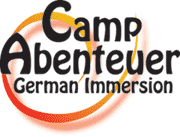Camp FAQs
Where do you hold your German overnight camp?
Camp Abenteuer is held at the Menucha Retreat and Conference Center in Corbett, OR. The scenic property includes woods, meadows, gardens, an outdoor labyrinth and activity areas (outdoor pool, tennis court, volleyball area).
What do campers do?
We speak German all day long. The day begins even before breakfast with morning stretching exercises in German. Meals are served in German, and counselors sit with the campers and lead conversations.
During the day, campers go to twice-daily German lessons where they may read a book, review grammar or work on a project, depending on campers’ ages, levels and interests.
After lessons, campers learn German in an active context through art or active games. A camp-wide pool time follows in the afternoon (weather permitting).
After dinner, we have a cultural activity such as our Olympische Spiele (Olympics) or Fasching (Carnival) or a Disko. (Disco) These are always fun ways to wrap up the day!
How do you work with different students’ skill levels?
Camp is a learning community for everyone.
All campers engage in physical morning exercises, meals, and most cultural activities.
Most of the day, students are divided into age groups, and work on age-appropriate projects. Crafts and activities vary by age.
During lesson time, students are matched by age, but within those groups, we also work with different skill levels, to challenge and support students to grow their skills.
Is Camp Abenteuer appropriate for students with no previous German?
Absolutely. Immersion can kick-start their skills. Some beginner students go on to regular programs in the fall and often really shine. For more about Sophie Scholl Schule’s programs during the academic year, see our website.
What can more advanced learners gain?
Campers who have either learned German at home or in the classroom may be missing the other half of the equation. Every day, Camp Abenteuer combines functional German with some formal German writing and reading instruction. Our skilled staff also provide structural support for those who are beginning their German study or who lack a formal background in the language.
In addition, older teens may apply to become counselors or junior counselors. Supporting younger learners will improve their own skills and confidence.
Where do students sleep?
In Menucha’s dormitories, campers are assigned a bunk based on gender and age. Counselors are housed in each area as well.
How are special needs handled?
For special learning needs, please discuss the issue and proven approaches with the camp director. This information will be handled confidentially and shared, as needed, with the camper's teacher.
With advance notice, we will accommodate special dietary requests.
A designated health counselor administers medication, as arranged by parents.
How do you address health and safety issues?
All of our staff are background-checked, complete a sexual assault awareness training and are trained in child safety. All staff are additionally vaccinated against Covid -19. The lifeguard, health counselor and cooks are appropriately certified.
Campers are supervised at all times. They are allowed free time in the afternoon and immediately after supper. Staff is in the area during all these times. In addition and in order to foster peer connection and confidence, we emphasize the buddy system for campers.
What's off limits?
Anything that disrupts the learning environment or threatens the safety of any campers: No cell phones at any time! Bring a separate camera for taking pictures. No other electronic devices (except during downtime), uncontrollably disruptive behavior, smoking, alcohol or drugs are permitted. Disciplinary action is at the discretion of the camp director. Serious transgressions will result in the camper’s dismissal, in which case we will not be able to refund.
How can I stay in touch with my camper?
Letters may be sent to Menucha (Camp Abenteuer, c/o Menucha Retreat and Conference Center, 38711 E Historic Columbia River Hwy, Corbett, OR 97019-9728). Please mail letters and packages early, up to a week before camp starts.
Campers MUST NOT use cell phones during camp. In an urgent or emergency case, contact will be established.
What if my child gets homesick?
Nearly everyone misses something about home when they're away. Whatever they miss, most children will have a great time at camp. Overcoming homesickness and enjoying time away from home nurtures children's independence and prepares them for the future.
Our caring staff help campers deal with homesickness should it arise. If a camper is severely homesick, we will arrange a phone call. If the situation continues, we will work with the family on other possible solutions. Most campers adjust quickly as they make new friends.
What happens if a camper has an accident or gets ill?
Camp staff, including the director and health counselor, will assess the situation and provide immediate care. When registering, parents are encouraged to provide their preferences for treating minor health issues. We will also notify parents of an incident just as soon as feasible.
What happens if a student is seriously injured?
For every emergency, including serious injury, the camp staff will seek emergency medical care at the local hospital. A camp staff member will contact the parents immediately while accompanying the student to the hospital.
How much is tuition?
Camp tuition includes all meals, starting with lunch on Sunday and finishing with lunch on Friday, language and art lessons and materials, evening events, and much more.
Tuition for our 2024 is $985 for the first sibling, including a $125 nonrefundable deposit. Sibling tuition is $935.
What is the cancellation policy?
Before April 30, 2024: full refund minus a $125 processing fee per camper
Between May 1 and June 30: full refund minus a cancellation fee of $125 per camper
After July 1, 2024: No refunds except in the case of a medical or family emergency (written notice required)

